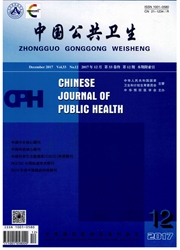

 中文摘要:
中文摘要:
目的了解医学院校大学生的人类免疫缺陷病毒/艾滋病(HIV/AIDS)相关知识、态度,并探讨其与依恋模式之间的关系.方法采用分层整群抽样的方法抽取1277名在校大学生进行了自填式问卷调查.结果调查对象的依恋模式为安全型占59.3%,沉溺型占18.3%,漠视型占13.1%,恐惧型占9.3%.HIV/AIDS相关知识与安全型得分呈正相关,与沉溺型、漠视型呈负相关.调查对象接纳感染者的态度与安全型呈正相关,与沉溺型、恐惧型呈负相关;对高危行为的反对程度与安全型呈正相关,与漠视型、恐惧型呈负相关;对感染的影响担心程度与沉溺型呈正相关,与漠视型呈负相关,与恐惧型呈正相关;对感染风险意识与安全型呈负相关,与恐惧型呈正相关.结论依恋模式对HIV/AIDS相关知识、态度有重要影响.
 英文摘要:
英文摘要:
Objective To study the HIV/AIDS-related knowledge and attitude among college students and to explore their relationships with attachment styles. Methods With stratified-cluster random sampling, 1 227 students were surveyed using self-administered questionnaire. Results The proportion of secure, preoccupied, dismissing and fearful attachment styles aceouted for 59.3 %, 18.3 %, 13.1% and 9.3 % respectively. Significant relationship was found between HIV/AIDS-related knowledge and secure attachment, preoccupied attachment and dismissing attachment; nondiscrimination of the HIV infected and secure attachment, preoccupied attachment and fearful attachment; objection against risk behaviors and secure attachment, dismissing attachment and fearful attachment; fear of the impacts of infection and preoccupied attachment, dismissing attachment and fearful attachment; awareness of infection risk and secure attachment and fearful attachment. Conclusion Attachment styles are closely linked to HIV/AIDS-related knowledge and attitude.
 同期刊论文项目
同期刊论文项目
 同项目期刊论文
同项目期刊论文
 期刊信息
期刊信息
